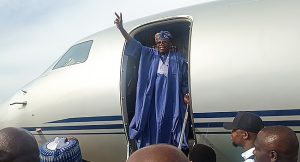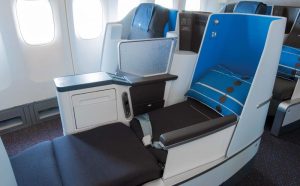
Paradox of profligacy: Tinubu’s jet amidst crushing poverty in Nigeria
Sopuruchi Onwuka
President Bola Tinubu’s recent acquisition of a new Airbus A330 business jet, amid Nigeria’s most severe economic crisis in decades, has sparked widespread outrage, drawing attention to the stark contrast between the government’s extravagance and the dire living conditions of millions of Nigerians.

 President Tinubu unsatisfied with existing presidential fleet
President Tinubu unsatisfied with existing presidential fleet
This $100 million purchase, which adds to the already bloated presidential fleet, comes at a time when the country is grappling with crippling inflation, a devalued currency, surging fuel prices, and rising poverty rates. The decision, widely criticized as insensitive and tone-deaf, highlights the growing disconnect between Nigeria’s ruling elite and the suffering of its citizens.
Nigeria, Africa’s most populous country, is currently facing an economic crisis of unprecedented scale. According to the National Bureau of Statistics (NBS), inflation surged to 34.2% in June 2023, marking the highest rate in 28 years. Although there was a slight dip to 33.4% in July, the high inflation has severely eroded the purchasing power of Nigerians, making basic goods and services increasingly unaffordable. The impact of this inflation is felt most acutely in food prices, with staples like rice, bread, and cooking oil becoming luxuries for many households.
The International Monetary Fund (IMF) has expressed concerns about the country’s economic trajectory, noting that Nigeria’s inflation is among the highest globally and continues to rise. The World Bank has warned that the country’s inflationary pressures, coupled with the government’s economic policies, are pushing millions more into poverty.
The depreciation of the Naira, which has lost approximately 70% of its value against the U.S. dollar since June 2022, further compounds these challenges. As of August 2023, the exchange rate hovers around N770 to the dollar on the official market, with rates often significantly higher on the black market, making imports more expensive and exacerbating inflation.
The country’s economic challenges are not merely abstract statistics—they translate into real and devastating impacts on the population.
According to the World Bank, nearly half of Nigeria’s population, or over 90 million people, live in extreme poverty, defined as living on less than $1.90 a day. The United Nations Development Programme (UNDP) has described the situation as a “humanitarian disaster in the making,” with millions of Nigerians unable to meet basic needs such as food, shelter, and healthcare.
 Better than already exists: Tinubu seeks higher grade of luxury
Better than already exists: Tinubu seeks higher grade of luxury
The multidimensional poverty index (MPI), a measure developed by the Oxford Poverty and Human Development Initiative (OPHI) and the UNDP, offers a broader perspective on poverty, considering factors such as education, health, and living standards. The MPI reveals that 63% of Nigerians are multi-dimensionally poor, meaning they are deprived in several areas of life simultaneously.
This high level of deprivation is not just a reflection of low income but also of limited access to essential services and opportunities, further deepening the poverty crisis in the country.
Worse still, the removal of fuel subsidies which is one of President Tinubu’s key economic reforms has exacerbated the situation, leading to higher transportation and goods distribution costs, which in turn have driven up the prices of basic commodities since the subsidies were cut.
 New business class comfort
New business class comfort
The fuel subsidy removal, initially justified as a necessary measure to reduce government spending and stimulate long-term economic growth, has had immediate and harsh repercussions on the lives of ordinary Nigerians. The high cost of fuel has led to widespread shortages, long queues at petrol stations, and, in some cases, violent protests.
In early August 2023, these economic pressures boiled over into social unrest as thousands of Nigerians took to the streets across the country to protest against the rising cost of living in the country. And greater number of youths mostly in the Northern parts of the country marched against bad governance and hunger.
The protests, which were met with a heavy-handed response from security forces, resulted in the deaths of at least 21 people, according to Amnesty International. The situation underscores the deep frustration and anger felt by many Nigerians who see little hope for relief under the current administration.
It is therefore in the midst of this economic turmoil that the decision to purchase a new presidential jet has been met with widespread condemnation. The timing of the acquisition—coming just weeks after the deadly protests and in the midst of a cost-of-living crisis—has amplified the perception that Nigeria’s leadership is out of touch with the struggles of its people.
Critics argue that the $100 million spent on the new Airbus A330 could have been better allocated to address pressing social and economic needs, such as improving access to healthcare, education, or social welfare programs.
The government’s defense of the purchase, based on claims of future savings in maintenance and fuel costs compared to the older Boeing 737-700 it replaces, rings hollow to many Nigerians who are struggling to afford even the most basic necessities. The luxury jet, configured for VIPs, is not seen as a tool of governance but as a symbol of the ruling elite’s detachment from the realities of life in Nigeria.
 No much difference between old and new
No much difference between old and new
The purchase also raises questions about the government’s commitment to austerity and fiscal responsibility.
While President Tinubu has announced a 60% reduction in the size of official travel delegations and other cost-cutting measures, the acquisition of a luxury jet appears to contradict these efforts. Again, neither the cost nor the necessity of the plane was disclosed to the public or approved by lawmakers neither the cost nor the necessity of the plane was disclosed to the public or approved by lawmakers. This lack of transparency has further fueled suspicions of government profligacy.
Most importantly, the contrast between President Tinubu’s opulent travel accommodations and the harsh realities faced by millions of Nigerians highlights the growing divide between Nigeria’s ruling elite and its impoverished populace. This gap is not just economic but also reflects a broader disconnect between the government’s priorities and the needs of its citizens.
While the president enjoys the comfort of a state-of-the-art jet, millions of Nigerians are struggling to survive in an increasingly hostile economic environment. This disconnect is also evident in the broader policy landscape.
The government’s seemingly necessary focus on cutting subsidies and reducing spending has disproportionately affected the poor and vulnerable. The IMF has noted that while fiscal consolidation is important for Nigeria’s long-term economic stability, it must be accompanied by measures to protect the most vulnerable segments of the population. However, such measures have been largely absent, leading to increased hardship for many vulnerable Nigerians.
The situation in Nigeria is a stark reminder of the challenges facing many developing countries, where rapid economic reforms often driven by international financial institutions can lead to significant social and economic dislocation if not carefully managed. In Nigeria’s case, the combination of high inflation, a depreciating currency, and rising fuel costs has created a perfect storm of economic hardship that threatens to undermine social stability and erode trust in government.
In sum, President Tinubu’s decision to purchase a new luxury jet amid Nigeria’s economic crisis is a powerful symbol of the paradox of profligacy in a time of widespread poverty. While the government justifies the acquisition as a cost-saving measure, the timing and scale of the expenditure have exposed the deep disconnect between Nigeria’s ruling elite and the struggles of its people.
As millions of Nigerians grapple with inflation, poverty, and social unrest, the purchase of a $100 million jet serves as a stark reminder of the widening gap between the country’s leaders and its citizens in a country where nearly half the population lives in extreme poverty
The Oracle Today posits that the acquisition of a costly presidential jet in additional many sub-optimized official jets now openly accessible to political associates of the president is an insensitive extravagance and a profound failure of leadership in the face of recent hunger protests and prosecution of the many protesters seeking better management of the nation’s resources.



